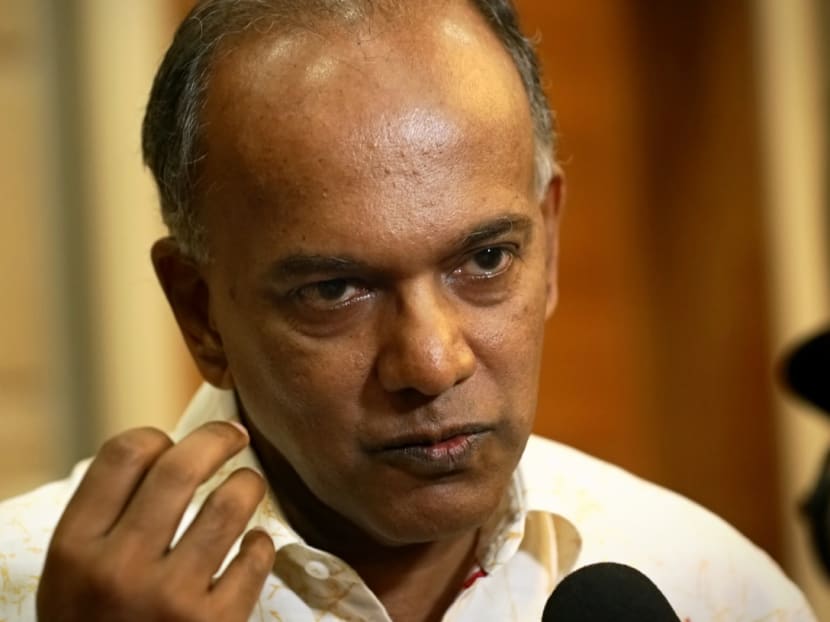Changes to anti-drug laws based on evidence, not about ‘going hard or soft’, says Shanmugam
SINGAPORE — Changes to the Misuse of Drugs Act that put greater focus on rehabilitation and shift a little away from the philosophy of long-term detentions were passed on Tuesday (Jan 15). The changes will potentially affect a significant number of drug abusers.
SINGAPORE — Changes to the Misuse of Drugs Act that put greater focus on rehabilitation and shift a little away from the philosophy of long-term detentions were passed in Parliament on Tuesday (Jan 15).
The changes will potentially affect a significant number of drug abusers.
Adult abusers who do not face other concurrent criminal charges will be channelled to a rehabilitation pathway. Around half of the abusers liable for long-term imprisonment can now be channelled to the rehabilitation regime, said Law and Home Affairs Minister K Shanmugam. Long periods of detention affect their ability to reintegrate back into society.
First-time abusers assessed by the Central Narcotics Bureau to be at low risk of further abuse will be put on a non-custodial supervision order called the Enhanced Direct Supervision Order. They will be assigned a case manager to support them and their families.
Mr Amrin Amin, Senior Parliamentary Secretary for Home Affairs, said that at the end of 2017, about 55 per cent of inmates at the Drug Rehabilitation Centre (DRC) — or 750 individuals — were first-timers.
Some may view the changes as the Government going “soft on drugs”, but Mr Shanmugam said that Singapore is taking the evidence-based approach.
“It is not going hard or going soft. There is no particular merit in being hard for the sake of being hard, or soft for the sake of being soft, or attaching labels like right-wing, left-wing, liberal,” he said as the debate wrapped up with 16 Members of Parliament (MPs) speaking on the proposed amendments.
“What is relevant is the evidence, how we deal with it, what is in the interests of society.”
Over time, the body of evidence on rehabilitation, counselling techniques, psychological interventions and other areas has grown, said Mr Shanmugam.
However, fundamentally, the philosophy of a drug-free Singapore has not changed.
The amendments also introduce new offences that target people who try to “contaminate” others by, for instance, introducing someone to a trafficker.
Other changes aim to protect children. For instance, it will be an offence for an adult possessing illicit drugs to knowingly or recklessly leave the substances within the access of a child.
The changes will kick in later this year, said the Ministry of Home Affairs (MHA).
KEY CHANGES TO THE MISUSE OF DRUGS ACT
1. Stronger rehabilitation regime for drug abusers
First-time abusers assessed to be of low risk of further abuse will be put on non-custodial supervision order
First-time abusers with moderate or high risk of further abuse, and second-time and subsequent abusers will go through the DRC regime, which varies in programme intensity and duration
Those who only consume drugs and admit to drug use can be put on the DRC regime. Currently, those who are arrested for the first and second time undergo rehabilitation in the DRC, while those who are arrested three times or more are sentenced to long-term imprisonment.
Maximum detention in the DRC will be increased from three years to four years
Maximum duration of supervision (after completion of community-based programme such as placement in a halfway house) to be increased from two years to five years
2. Acts of contamination, which facilitate or promote drug use, will constitute a crime
These include actively introducing a drug trafficker to another person, knowing that the trafficker is likely to supply him with drugs
First-time convictions will be subject to a maximum jail term of five years or a fine up to S$10,000, or both
For subsequent convictions, there will be a mandatory minimum jail term of one year
3. Exposing children to drugs and drug utensils or permitting them to consume drugs will be a crime
4. Expansion of drug detection methods to include hair analysis, which can detect drugs consumed beyond the past week
- Saliva screening will also be introduced
QUESTIONS RAISED BY MEMBERS OF PARLIAMENT
How will the authorities handle travellers who enter Singapore with legitimately prescribed scheduled drugs such as medical cannabis, asked Nominated MP Irene Quay. Mr Amrin said that the travellers will have to obtain an import approval before arriving in Singapore. Applications will be considered on a case-by-case basis by the Health Sciences Authority and the medication must have been prescribed by qualified medical practitioners.
How frequently may abusers under rehabilitation need to take time off work and forgo their daily income in order to report for drug tests, asked Mr Faisal Abdul Manap, MP for Aljunied Group Representation Constiuency. Mr Amrin said that the MHA will look to leverage technology to reduce the frequency of reporting.
Why is there a mandatory minimum sentence of one year for drug consumption when there was none before, some MPs such as Mr Murali Pillai (Bukit Batok) asked. Mr Amrin said that it is to reflect a strong deterrent stance against drugs. The courts have the discretion to sentence above the prescribed minimum, up to a maximum of 10 years. The courts may also order the drug consumption sentence to run concurrently or consecutively with that of other charges.












